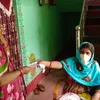This 17-year-old changemaker is helping women in rural India become self-reliant
Founded by Anushree Aggarwal, non-profit Vigyanit Foundation is helping women in rural India become self-reliant through mentorship and lessons in computer science.

Anushree Aggarwal, Founder, Vigyanit Foundation
At 13, Anushree Aggarwal understood what she learnt in social science classes about leadership and society in rural India was vastly different when it came to reality.
As an eighth-grade student Anushree was aware that some seats of electoral constituencies were reserved for women to ensure fair representation in roles in the panchayat (village council) and as sarpanch (head of the village). She thus believed that women’s problems and needs were taken care of until she happened to oversee a sarpanch meeting in Murtizapur district of Maharashtra in 2016.
She recalls, “There was a woman in ghunghat with five other men in the two-hour-long meeting and everyone spoke except for the woman. I was quite taken aback and went to her later and told her that I waiting for her to speak up and her reply hurts me even today.”
Anushree was told that even though the woman represents her village 9 to 5, she represents her family beyond this and cannot defy the rules and expectations of her family and in-laws.
Self-reliance and independence
A self-taught computer enthusiast, Anushree sees her future in the field of computer science and realised that women from rural India should also benefit from the far-reaching advantages of technology.
“Delhi is a metro city and there are resources available for various career options but I realised that in rural areas, technology advancements are not available to the extent it can be considered a career choice,” she says, adding she wanted to introduce computer science as a way for girls to become self-reliant and independent. With this aim in mind, she founded the Vigyanit Foundation in 2016.
However, this was not as simple as she thought it would be. While she planned on promoting tech-based education, Anushree learnt that it was not realistic to introduce coding or artificial intelligence without understanding their perceptions.
The reality, she says, is most women were not financially secure. “I could not convince them to come and learn computers,” she adds. That is when the changemaker put her technological skills and knowledge to use and built an app, which provides them information regarding government schemes available and the nearest and most relevant Self Help Groups (SHGs) to share resources.

Anushree Aggarwal in Murtizapur district, Maharashtra
The women are required to sign up on the app by sharing basic information such as name, contact, number, village or constituency they belong to, and their occupation. Vigyanit Foundation also partnered with organisations like Green Agro Multipurpose Foundation and KVAS to leverage their existing data and resources.
The app is designed to show the most suitable SHGs and government schemes based on their location and occupation.
In the course of her interactions with women, she found that most of them were unaware of ways to seek loans from formal financial institutions – whether to avail the complete loan or in intervals and were not aware of the best interest rates in the market. The lack of awareness also led them to conveniently turn to private lenders who impose high interest rates. As a result, they invariably ended in a debt trap.
Through mentorship and help in availing government benefits and schemes, Anushree says, their income have increased by nearly 25 percent.
“Women can also share if they come across new government schemes and other resources. The role of Vigyanit Foundation comes in the form of mentorship and connect - we foster information-sharing and make things more accessible,” she adds.
Present in Maharashtra, Manipur, and Nagaland, the foundation has organised and mentored around 400 SHGs and connected over 1700 women to various programmes and schemes so far.
Tech education
As the financial burden of the women eased, Anushree encouraged them to learn computer skills to help them track their artisanal business activities.
Beginning with three participants, it started SheSharp Fellowship (named after programming language C Sharp) in 2019. Gaining popularity through word-of-mouth, the fellowship now trains women and their children as well. Depending on the level of understanding and interest in computer science, they are taught basic functions like various Microsoft software or more advanced levels such as HTML and coding.
The sessions are conducted virtually over Skype and mentors including Anushree follow up individually on their progress and understanding of the lessons. As language is a minor barrier since most participants are not fluent in Hindi, Ansuhree sends lesson scripts translated in their native language.
Following these lessons, women are now capable of using spreadsheets to keep track of their finances and revenue. In fact, 23-year-old Kalyani who now heads the organisation in Maharashtra was among the early members who benefited from the program.
She had to give up her passion and talent for computer science due to lack of resources in the village and says joining Vigyanit Foundation made it possible to engage in computer-related lessons.
Moving ahead, Anushree hopes to build computer labs and incubation centres to encourage entrepreneurship among women in rural India
Edited by Rekha Balakrishnan








